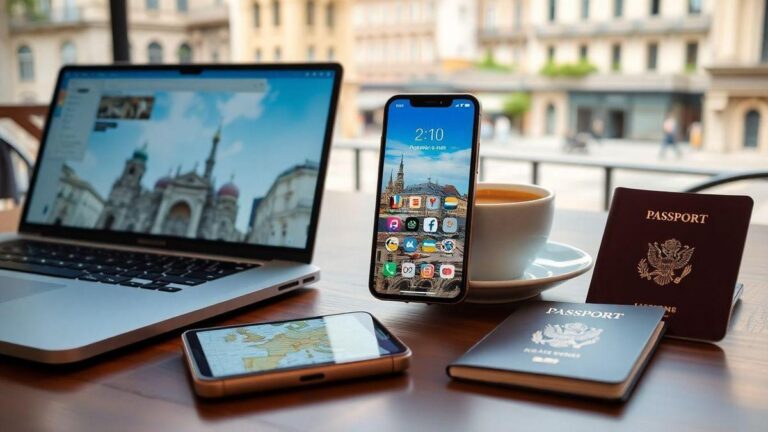Best language learning apps for digital nomads in nonEnglish speaking regions
Looking for the best language learning apps for digital nomads in non-English speaking regions? You’ve come to the right place! In this article, we will explore the top features these apps have to offer. From user-friendly interfaces to offline access, we’ll help you choose the perfect app for your travel needs. Plus, you’ll discover how these apps can help you connect with locals, build cultural understanding, and enhance your communication skills. Let’s dive in!
Key Points
- Discover the best language learning apps for digital nomads in non-English speaking regions.
- Improve your speaking and listening skills easily.
- Find apps with fun games and quizzes for practice.
- Use offline features when you can’t connect to the internet.
- Connect with local speakers using language exchange options.
Top Features of the Best Language Learning Apps for Digital Nomads
User-Friendly Interfaces
When you’re on the go, the last thing you need is a complicated app. The best language learning apps for digital nomads have user-friendly interfaces. This means you can jump right in and start learning without wasting time figuring out how to navigate the app. Look for apps that have clear menus, simple buttons, and engaging visuals. A smooth experience keeps you motivated to learn.
Offline Access for Travelers
Imagine you’re in a cozy café in Paris, sipping coffee, and you want to practice your French. If your app requires internet access, you might be out of luck! That’s why having offline access is a game-changer. The best apps let you download lessons, so you can learn anywhere, even without Wi-Fi. This is especially helpful when you’re traveling in areas with spotty internet connections.
Importance of Mobile Language Learning
Mobile language learning is crucial for digital nomads. It allows you to squeeze in lessons during your travels. Whether you’re waiting for a flight or relaxing at a beach, you can whip out your phone and dive into a lesson. This flexibility makes it easier to stick to your language goals.
Here’s a quick look at why mobile learning is essential for you:
| Benefits of Mobile Language Learning | Description |
|---|---|
| Convenience | Learn anytime, anywhere. |
| Flexibility | Fit lessons into your schedule. |
| Engagement | Interactive features keep you interested. |
In short, the best language learning apps for digital nomads in non-English speaking regions combine user-friendly interfaces and offline access to make learning a breeze, no matter where your adventures take you.
How Language Learning Apps Help You Connect with Locals
Building Cultural Understanding
When you dive into a new language, it’s like opening a door to a whole new world. Language learning apps are fantastic tools that help you understand the culture behind the words. Imagine chatting with locals about their favorite foods or traditions!
These apps often include cultural tips and phrases that help you blend in. For example, when you learn how to say thank you in a local language, you’re not just learning words; you’re showing respect. This little effort can go a long way in making friends and feeling at home.
Enhancing Communication Skills
Let’s face it, communicating in a new language can feel like trying to solve a puzzle with missing pieces. Language learning apps help you put those pieces together. They offer interactive exercises that make learning fun and engaging.
Here are some ways these apps boost your communication skills:
- Practice Speaking: Many apps have voice recognition features that help you improve your pronunciation.
- Real-life Scenarios: You can practice conversations you might have in a café or at a market.
- Instant Feedback: Get tips on where you can improve right away.
These features help you become more confident when talking to locals. The more you practice, the easier it gets!
Language Learning Tools for Expats
If you’re an expat, you know how important it is to connect with your new community. The right language learning app can be a game changer. Here’s a quick table of some of the best language learning apps for digital nomads in non-English speaking regions:
| App Name | Features | Best For |
|---|---|---|
| Duolingo | Gamified lessons, daily goals | Beginners |
| Babbel | Real-life dialogues, grammar tips | Intermediate learners |
| Memrise | Vocabulary building, video clips | Visual learners |
| HelloTalk | Language exchange with natives | Speaking practice |
These tools are not just about learning; they help you connect with locals and understand their way of life.
Choosing the Right Language App for Your Needs
Comparing Subscription Models
When you’re on the hunt for the best language learning apps for digital nomads in non-English speaking regions, subscription models can play a big role in your decision. Here are a few things to think about:
- Monthly vs. Annual: Some apps offer a monthly subscription, while others have annual plans. If you’re planning to stick around for a while, an annual plan might save you some cash.
- Free Trials: Many apps let you try them out for free. This is a great way to see if the app fits your style before you commit.
- Family Plans: If you’re traveling with friends or family, look for apps that offer family plans. This way, you can all learn together and save some money.
| Subscription Type | Cost | Features |
|---|---|---|
| Monthly | $10/month | Basic access |
| Annual | $100/year | Full access, offline mode |
| Family Plan | $150/year | Multiple accounts, shared features |
Evaluating Language Options
Choosing a language is like picking a flavor of ice cream—you want to enjoy it! Here’s how you can narrow down your choices:
- Your Goals: Think about why you want to learn a language. Is it for travel, work, or just for fun? Your goals can help you choose the right language.
- Local Needs: If you’re in a non-English speaking region, consider learning the local language. It can help you connect with people and make your travels smoother.
- App Features: Look for apps that offer the language you want along with features like speech practice, games, and cultural lessons.
Finding the Best Language Apps for Non-English Regions
When you’re in a non-English speaking region, finding the right app can make all the difference. Here are a few tips to help you out:
- Local Recommendations: Ask locals or fellow travelers about their favorite apps. They can give you the inside scoop on what’s working for them.
- Cultural Context: Choose apps that include cultural lessons. Understanding the culture can help you learn the language faster.
- Community Support: Look for apps that have a strong community. Being part of a group can motivate you and provide extra help when you need it.
Frequently Asked Questions
What are the best language learning apps for digital nomads in non-English speaking regions?
Every digital nomad has different needs. Some great options are Duolingo, Babbel, and Rosetta Stone. They make learning fun and easy!
Can I use these apps offline?
Yes! Most of the best language learning apps for digital nomads in non-English speaking regions let you download lessons. This is super handy when you’re traveling and don’t have internet.
Are these apps free?
Many apps have free versions. However, they might limit some lessons. If you want full access, consider a paid plan.
How long should I use these apps each day?
Just 15-30 minutes daily can make a big difference. Short sessions help you remember better and keep you motivated!
Can I learn slang and local phrases with these apps?
Some apps include slang and real-life phrases! Check the app details to see if they cover what you want.

Hey, I’m Paula — traveler, language nerd, and the curious mind behind znewz.com. I’ve always believed that real connections happen through words, gestures, and shared experiences — not algorithms. That’s why I created this blog: to share travel stories from around the world and explore how language helps us connect in ways that AI still can’t. Whether I’m getting lost in a tiny town or striking up a chat in a language I barely know, I’m here to show that sometimes the best moments happen when tech takes a back seat.






